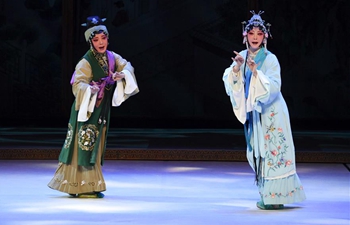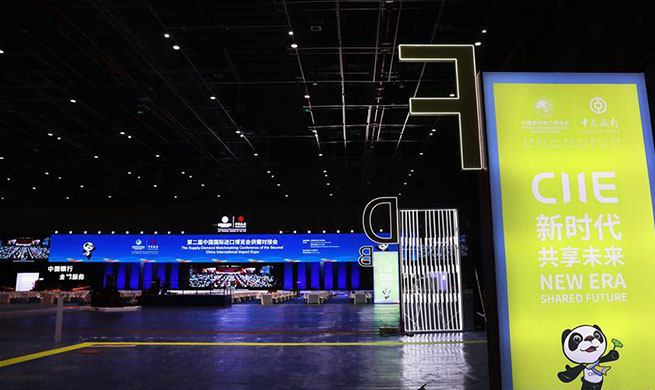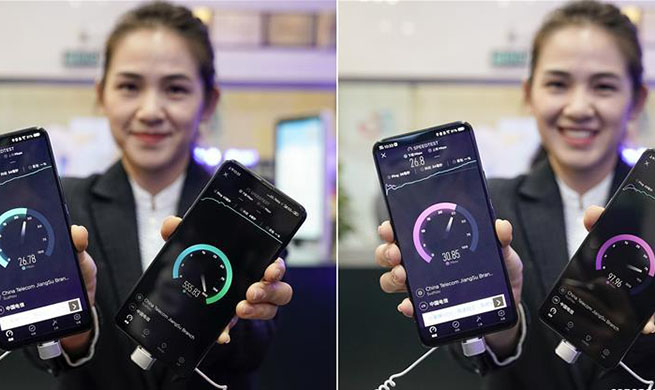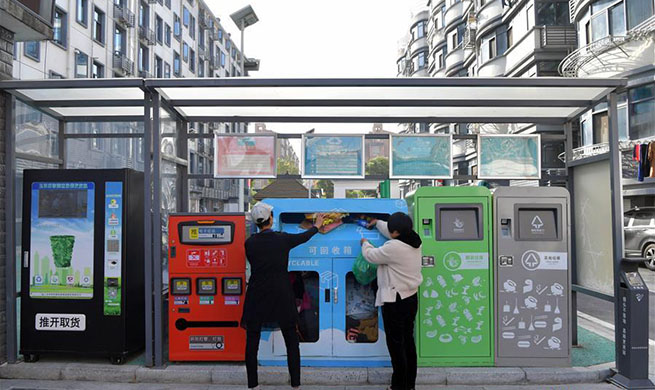TOKYO, Oct. 31 (Xinhua) -- The Bank of Japan (BOJ) opted to keep its monetary policy unchanged after a policy setting meeting on Thursday, although the central bank underscored its enduring stance that it stood ready to cut rates if necessary and has the policy tools to do so despite some experts' concerns to the contrary.
In a statement released after the two-day meeting at which it decided to keep its ultra-easy policy unchanged, the central bank said it expected interest rates to stay at their current or lower levels so as to keep its two percent inflation target feasible.
The BOJ "expects short- and long-term interest rates to remain at their present or lower levels as long as there is a possibility of losing momentum toward the 2-percent inflation goal," Japan's central bank said.
Further adding to speculation the central bank is primed and may follow suit with other central banks in cutting their rates, the BOJ downgraded its growth and inflation forecasts in the years to come, indicating, although not confirming, once again that more stimulus measures "could" be on the way.
In terms of the bank's price outlook, the BOJ cut its inflation forecast for fiscal 2019 through March to 0.7 percent from 1.0-percent forecast in July.
The central bank also lowered forecasts for fiscal 2020 to 1.1 percent and 2021 to 1.5 percent, from previous forecasts of 1.3 percent and 1.6 percent, respectively.
Economists said, however, that some doubts remain as to whether the central bank has enough stimulus measures left in its "arsenal" if it were to follow other central banks' moves to lower interest rates to support the economy.
Makoto Sengoku, market analyst at the Tokai Tokyo Research Institute, suggested that the BOJ leaving its monetary policy unchanged signaled that for the time being the economy is being viewed by the central bank as not faltering, which in the short-term eased market concerns.
"That sent relief to market participants as many had feared the economy could be a lot worse, with some even expecting immediate easing," Sengoku said, as both the stocks and financial markets showed a muted reaction Thursday to the BOJ's forward guidance.
But other analysts pointed out that the central bank's latest policy moves and outlook were not based on actual economic fundamentals, suggesting the bank could have taken more measures to underpin the economy.
"The BOJ's tweak of its forward guidance is very ambiguous and had little impact on the markets and price outlook," Hiroshi Miyazaki, senior economist at Mitsubishi UFJ Morgan Stanley Securities Co., was quoted as saying.
"Its policy-making is not based on recent economic data that have shown the Japanese economy is slowing," Miyazaki said.
He went on to say that the BOJ could have lowered its interest rates further into negative territory and made better provisions to support commercial banks.
BOJ Governor Haruhiko Kuroda reiterated at a post-meeting news conference on Thursday that the central bank's enduring stance, although yet to be implemented, that it remains poised to roll out additional easing measures at will.
"Our new forward guidance is aimed at clarifying our stance that our policy bias is leaning towards additional monetary easing," Kuroda said, adding, "Our new forward guidance shows that we won't see an end to ultra-low rates until way beyond spring 2020. We've said rates could remain low, or even lower, for some time."
As to concerns the BOJ was running out of possible new stimulus measures, Kuroda refuted this again in contrast to some leading economists' opinions.
"We can cut interest rates, increase asset buying or accelerate the pace of increase in base money. We have various options and what tools we use will depend on economics, price, and financial developments at the time. We can combine them or take the most appropriate step. We haven't narrowed our options just to interest rate cuts," the BOJ chief said.
In terms of the impact of October's consumption tax hike from 8 to 10 percent on the economy, Kuroda remained somewhat equivocal.
"The impact on consumption appears to be small compared with the last tax hike in 2014. But we need to look at upcoming data to examine how the impact could play out," he said.
At the conclusion of its two-day meeting Thursday, the BOJ Policy Board voted to keep short-term interest rates at minus 0.1 percent while guiding long-term rates around zero percent.
The central bank also opted to maintain its massive asset purchasing program.
Kuroda added that even if the bank expanded its stimulus program in line with other central banks it would not prevent the bank from taking action.
"But the fact that any easing step would have costs won't keep us from loosening policy. We need to carefully weigh the pros and cons of each policy. If needed, we will take steps to mitigate the side-effects of monetary easing," said the BOJ chief, known for maintaining an overly optimistic yet ambiguous stance and churning out consistently dovish economic remarks so as to tackle what he described as Japan's "deflationary mindset."













